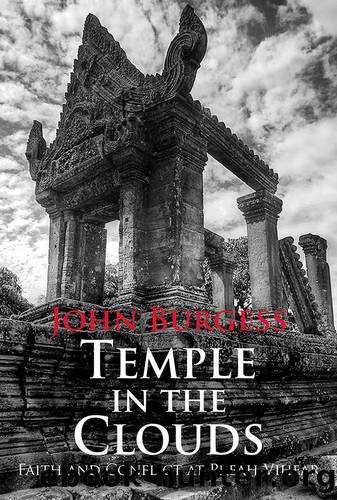Temple in the Clouds: Faith and Conflict at Preah Vihear by Burgess John

Author:Burgess, John [Burgess, John]
Language: eng
Format: epub
Publisher: Unknown
Published: 2015-10-13T16:00:00+00:00
Handwritten notes by Dean Acheson, penned during the 1961 hearing. Courtesy of Brooke Clagett.
When the former secretary of state rose to make his first address to the court, he opened with a polite scolding of the Thai side. It’s too bad, he said, that rather than seeking a judgment that the court had no jurisdiction, Thailand did not simply confirm the jurisdictional renewal that it had so clearly wanted in 1950 and let the real trial proceed. ‘We would get on much more quickly with that willing and confident approach to the merits’ that Thailand claimed to have, he said. Then Acheson switched tone and had some mocking fun with the word ‘renew,’ the operative verb in Thailand’s 1950 declaration. Thailand had made semantic arguments in its pleadings that something that has expired simply cannot be renewed. Renewal applies only to something that exists at the time of the renewal. But, said Acheson, ‘the dictionary tells us that among the meanings, the common meanings, of the word “renew” are “to make new again,” to “re-establish,” to “rebuild,” to “revive.” There are many dictionaries which confirm what I have said.’ And lots of literature. He quoted the King James Bible: ‘Hide thy face from my sins, and blot out all mine iniquities. Create in me a clean heart, O God; and renew a right spirit within me.’ And Shakespeare: ‘Give renew’d fire to our extincted spirits, and bring all Cyprus comfort!’ He also quoted uses of the word in pleadings that other countries had filed with the court.
With its 1950 declaration, he said, ‘plainly, Thailand did not intend a futile act. It did not intend to continue its submission to the compulsory jurisdiction of the Permanent Court, which had then been dead for four years. But it did intend, clearly intend, to subject itself to the compulsory jurisdiction of some court, and it identified that court as this court….It would, indeed, be a perverse technicality, I submit, which would frustrate so manifest a demonstration of sovereign will.’
As for Soskice’s argument that will is not enough if the formalities are not followed, ‘I submit, if the Court please, that consent is not a matter of formalities. I submit that consent is evidence by the plain and ordinary meaning of words, or indeed of acts. Consent is not hedged about by traps of formality for the unwary or unskilful, like a putting green on a golf course.’
Cambodia’s two other main foreign counsels followed up with buttressing arguments.
Soskice got a chance of rebuttal and pronounced himself impressed with Acheson’s oratory. He offered a quotation from Virgil in response, Hinc illae lacrimae , ‘hence these tears.’ The tears, he was suggesting, were Acheson’s, and flowed because Cambodia’s case faced in Soskice’s view an immovable obstacle, the Israel v. Bulgaria decision. ‘That is why we listened to such a moving appeal to this Court, in effect, to disregard that decision.’
It fell to Acheson to make the main closing remarks for the Cambodian side. But first he gave mock praise for Soskice’s presentation.
Download
This site does not store any files on its server. We only index and link to content provided by other sites. Please contact the content providers to delete copyright contents if any and email us, we'll remove relevant links or contents immediately.
Ways of Seeing by John Berger(1342)
Rembrandt Drawings by Rembrandt(1166)
The Perfumes The A-Z Guide by Luca Turin(1138)
The Hare with Amber Eyes by Edmund de Waal(1124)
It's Never Too Late to Begin Again by Julia Cameron(1041)
On Photography by Walter Benjamin(971)
Natasha's Dance by Orlando Figes(934)
A Month in Siena by Hisham Matar(902)
The Selected Poetry of Rainer Maria Rilke by Rainer Maria Rilke(871)
Why Architecture Matters by Paul Goldberger(865)
Minor Feelings by Cathy Park Hong(864)
0062259628 by Sarah Strohmeyer(847)
The Death of the Artist by William Deresiewicz(847)
The Sound of Paper by Julia Cameron(838)
0544325265 by Brendan Jones(835)
Citizen: An American Lyric by Claudia Rankine(822)
Proust Was a Neuroscientist by Jonah Lehrer(810)
Perfumes the Guide 2018 by Luca Turin(798)
And Our Faces, My Heart, Brief As Photos by John Berger(759)
